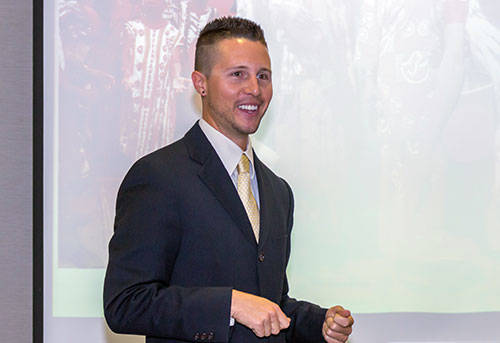 Now in its fourth year, NCBA CLUSA’s USAID-funded Farmer to Farmer program links American agribusiness professionals with farmers and farmer cooperatives in the developing world who request technical assistance, and offers NCBA CLUSA members and supporters with technical expertise an opportunity to share their knowledge.
Now in its fourth year, NCBA CLUSA’s USAID-funded Farmer to Farmer program links American agribusiness professionals with farmers and farmer cooperatives in the developing world who request technical assistance, and offers NCBA CLUSA members and supporters with technical expertise an opportunity to share their knowledge.
NCBA CLUSA staff and leadership last week were inspired by a recently returned volunteer whose assignment in Senegal saw him putting technical knowledge to work to empower the lives of smallholder farmers and gain a deeper understanding of the realities of life in rural northeast Senegal.
Agriculture development professional and soil scientist Chris D’Aiuto spent two weeks in the remote Matam region of northeast Senegal volunteering as a composting and conservation farming expert.
“What I love about the program is its ground-up approach,” D’Aiuto said. “This isn’t an old, outdated model of development. It equips farmers with the knowledge and skills they want, ask for and need to become better producers, and I find that to be the most transformational type of development work.”
D’Aiuto worked closely with local project coordinator Abibou Dia and local host organization Fonds de Solidarite Local, a 43-member cooperative of women smallholder farmers who produce onions, cabbage, tomatoes, eggplant and other horticulture products in small plots during Senegal’s eight-month dry season.
On average, the Matam region of Senegal receives 15–16 inches (400 mm) of rainfall per year, concentrated in the brief wet season between June and September, when flooding is a predictable concern due to the region’s nearly impenetrable clay soil.
“When 0.30 – 0.40 inches (8 to 10 mm) is what you need to keep your crop from wilting during the dry season, there’s such a small margin of error in this region. It was astounding to me that people are farming in these circumstances, making it productive and living their lives here,” D’Aiuto said.
To help smallholder farmers understand the concept of protecting and enriching their soil, D’Aiuto found himself relying on analogies. One in particular resonated with the women of Fonds de Solidarite, he said: “The soil is like a bank. You can’t take out what you don’t put in.” That concept “just clicked” with the smallholders, he said. “They immediately understood that we can’t just keep taking from the land. If we give it something, it will give back to us.”
Everywhere he conducting training sessions, D’Aiuto said the smallholders he met were eager to engage and excited to put their newfound knowledge into practice, despite the limitations of language. In some places, his English was translated three or four times before getting to Pulaar, the language spoken in the Senegal River valley area.
D’Aiuto’s demonstrations and training sessions covered the three principles of conservation farming—minimum soil disturbance, organic soil cover and crop rotation. One morning after a training session on mulching, D’Aiuto noticed one of the smallholder farmers collecting grass along the edges of empty plots.
“She was already starting to mulch. It was incredible to me that the very next day, she was using her time to collect grass and put it around where she had seeded her plants, believing that it’s going to help maintain moisture and help those plants grow. I think if I had left at this point, I would have been happy, just knowing that she got it.”
D’Aiuto also demonstrated a composting method ideal for the tropics called thermal stacking, a raised one-meter cubed bed comprised of layers of “greens” (manure, fresh leaves, grasses and other nitrogen-rich materials) and “browns” (dead leaves, straw, corn stalks/cobs/husks and other carbon-rich materials). The layering balances the opposing nutrients and accelerates decomposition by introducing oxygen, heat and moisture.
D’Aiuto taught in-depth composting techniques to some 20 community-based service providers (CBSPs) to augment the USAID-funded Yaajeende project, which NCBA CLUSA is currently implementing in four regions of Senegal.
One of the CBSPs, a young man named Soulamon, had never undergone formal training—everything he knew about composting came from a Yaajeende brochure he had found. Still, he had already made and sold 25 tons of compost, earning 2 million francs (US$4,000) in just a few months—more money than what most Senegalese make in a year. At age 30, he was also the youngest CBSP.
The Farmer to Farmer volunteer opportunity fell during a lull in employment for D’Aiuto—his visa to return to South Africa for his job with the non-profit Harvest of Hope is pending.
“In these moments of down time, which I think are more and more common in our economy, how do we spend our time?” D’Aiuto asked. “Are we just looking for that part-time job to make a few dollars, or are we looking for a way to give back? That’s what I found in volunteering for Farmer to Farmer—a way to not just sit around and wait for my visa but to use all of the knowledge that I’ve gained to enrich other people’s lives.”
D’Aiuto holds a master’s degree in Soil Science from North Carolina State University in Raleigh. He has five years of experience in the agriculture sector, specifically in soil science, research and project implementation. He is a consulting soil specialist for Harvest of Hope in South Africa and has worked as a research assistant at Educational Concerns for Hunger Organization and a research and teaching assistant at NC State.
To learn more about Farmer to Farmer, or to volunteer for an upcoming assignment, email Farmer to Farmer program manager for Senegal Jane Podolsky at jpodolsky@ncbaclusa.coop.


